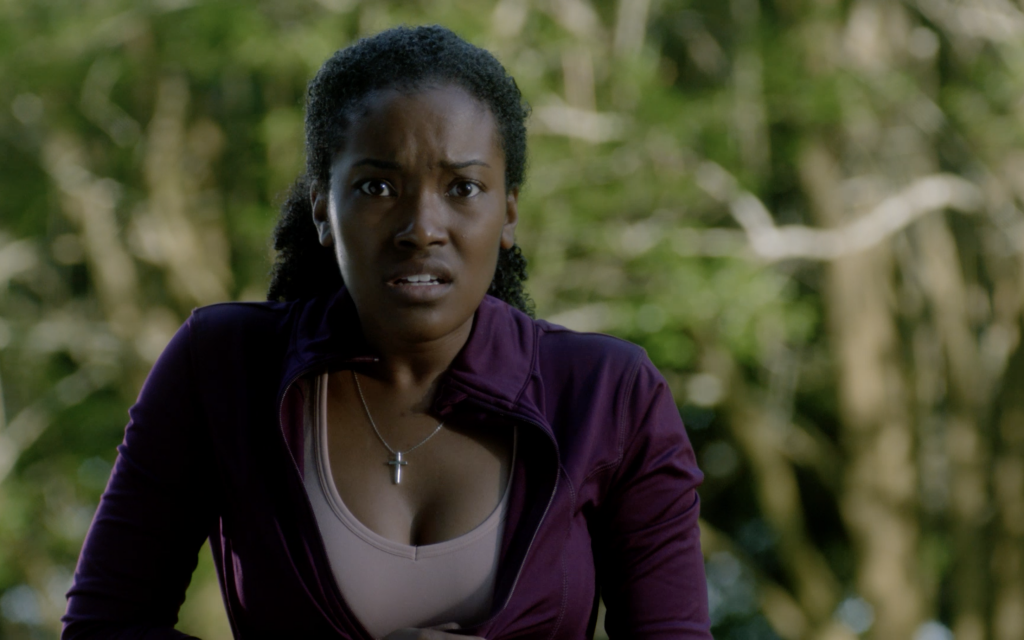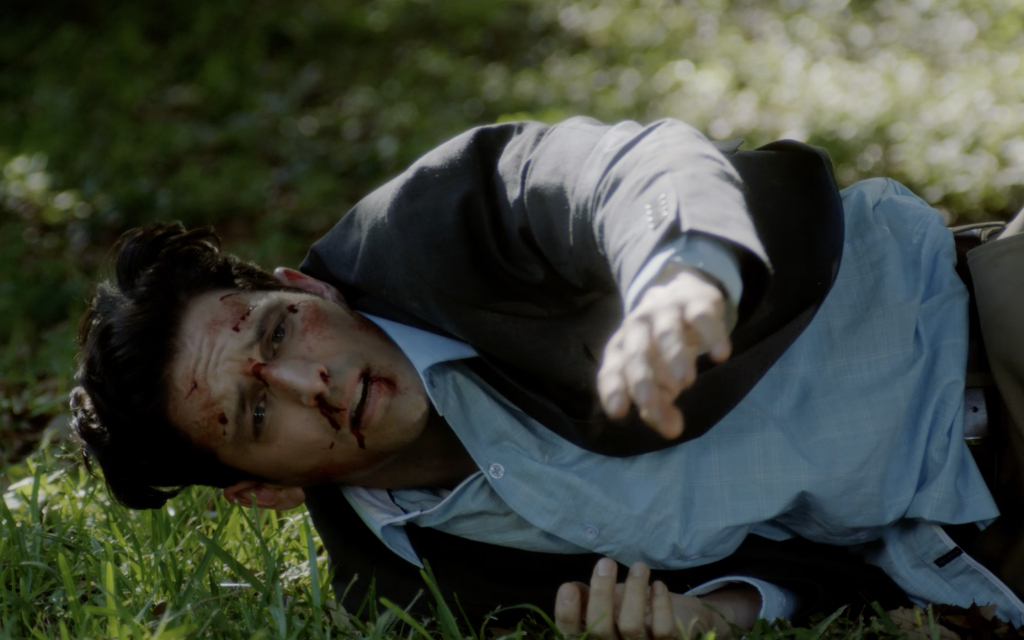October 29, 2020
by Carla Hay

Directed by Jeffrey Reddick
Culture Representation: Taking place in an unnamed U.S. city, the horror film “Don’t Look Back” features a predominantly white cast (with some African Americans, Latinos and Asians) representing the middle-class.
Culture Clash: Six witnesses to a homicide seem to be targeted by a vengeful killer because the witnesses stood by and didn’t do anything sooner to help the homicide victim.
Culture Audience: “Don’t Look Back” will appeal primarily to people who don’t mind watching low-budget horror flicks with an unimaginative story, big plot holes and mediocre acting.

The horror movie “Don’t Look Back” was written and directed by Jeffrey Reddick, the writer/creator of the “Final Destination” horror-movie series, which featured survivors of various traumas who are haunted and killed off, one by one, by mysterious forces. (Each “Final Destination” movie had a deadly trauma, including a plane crash, a multi-car accident, a building collapse, and a roller-coaster derailment.) Reddick brings a similar premise to the subpar “Don’t Look Back,” a story about witnesses to a murder who become the targets of supernatural terror and serial killings. Unfortunately, “Don’t Look Back” (formerly titled “Good Samaritan”) has too many predictable clichés and too many shoddily written scenes for it to be considered “so bad it’s good.” It’s just plain bad.
“Don’t Look Back” has this over-used horror stereotype: the protagonist is a young female with a “good girl” image. However, the “Don’t Look Back” filmmakers at least defied racial stereotypes in horror movies, by casting the lead character Caitlin Kramer (played by Kourtney Bell) as an African American woman. Usually in horror movies, when an African American woman is the lead character, the rest of the cast is predominantly African American too. (One of the few exceptions is 2019’s “Ma,” starring Octavia Spencer.)
Caitlin’s race is never mentioned in the movie, because it doesn’t need to be. Even though “Don’t Look Back” is not a typical horror movie in its racial casting for the main protagonist, it still doesn’t erase the movie’s biggest flaw: the very hackneyed screenplay. People who’ve seen enough horror movies will be able to easily predict exactly how this story is going to go. But the movie’s ending still manages to disappoint because it comes across as a bad parody instead of something that should be terrifying.
“Don’t Look Back,” which takes place in an unnamed city, begins on Caitlin’s birthday, which is on August 27. The number 27 is repeatedly brought up in the movie as a symbolic number. But ultimately, it’s an element of the plot that’s not very important in figuring out who’s going to be next target of the murderous rampage in the story.
Caitlin (who appears to be in her mid-20s) is spending a quiet birthday with her widowed father (played by Orlando Eric Street) at their house. It’s morning, and he’s just made her some birthday pancakes, when the doorbell rings. Caitlin answers the door, and two masked intruders with guns burst in the home, while one of the home invaders asks Caitlin’s father: “Where’s the money?”
Caitlin and her father barely have time to react before they’re both shot. Caitlin survives, but her father doesn’t. Caitlin’s hospitalization is never seen in the movie, but she mentions later in the story that she was “dead” for three minutes. And she starts to believe that her near-death experience has given her psychic abilities or at least the ability to see dead people.
After the home invasion, the movie flashes forward to an unspecified time, but it can be assumed that it’s at least a year later. Caitlin is in therapy. She’s feeling survivor’s guilt and she’s also experiencing nightmares. She’s still living in the same house where the murder happened. But this time, she has a loving and supporting live-in boyfriend named Josh Bowman (played by Skyler Hart), who suggests that they move to a new home. However, Caitlin is reluctant to move because the house has too many memories of her father that Caitlin doesn’t want to leave behind.
Caitlin is trying to get her life back on track, because in one of the movie’s early scenes, she mentions to Josh that she “asked the school for my job back,” which is an indication that she stopped working during her recovery. There isn’t much context to these movie’s characters. For example, it’s never explained how long Caitlin and Josh have been together or how they met, but it’s briefly mentioned that Josh is a rising star at his unnamed corporate business job.
One day, while Caitlin is jogging in a public leisure area called Bristol Park, she accidentally drops her thermos. A stranger walking near her kindly returns the thermos to her. They introduce themselves to each other—he says his name is Douglas (played by Dean J. West)—and Caitlin thanks him and is about to continue on her way. But within seconds, she sees another man (played by Eric Stratemeier) run up to Douglas and start viciously attacking and beating up Douglas.
Caitlin and other people who are witnessing this assault stand by in shock. One of the bystanders takes out his phone and begins video recording the attack. Before Douglas collapses, he manages to gasp out, “Help me.” Caitlin snaps out of her shock and grabs the bystander’s phone and calls 911 for help.
However, several hours later, it’s reported in the news that Douglas died from his injuries, and his murderer is still on the loose. The murder victim was Douglas Helton, a local philanthropist who was well-respected in the community. One of Douglas’ ongoing charity endeavors was building shelters for victims of domestic violence.
The murder becomes a high-profile story in the news, and the people who were the bystanders to Douglas’ murder get a lot of criticism from the media and the general public. Rainn Wilson has a cameo in the movie as a TV news host named George Reed, who verbally blasts these bystanders and tries to portray them as complicit in the murder of Douglas. Some people in the general public think that the bystanders should be arrested, even though technically the bystanders didn’t do anything illegal during this murder.
At first, the public only knows the identity of one of the bystanders: computer programmer Nathan Rome (played by Stephen Twardokus), the man who recorded the murder on his phone in a video that has gone viral. Nathan is interviewed on George’s news program to defend his actions of video recording the assault instead of calling for help. Nathan explains that he didn’t call for help because he didn’t know if he would be attacked too. It’s an excuse that doesn’t help Nathan look more sympathetic, and there’s further backlash from the public.
In addition to Caitlin and Nathan, the other bystanders (who are mostly in their mid-to-late 30s) are single mother Althea Minnis (played by Jaqueline Fleming); Tony Cusumano (played by Han Soto); Curt Miley (played by Damon Lipari); and hair stylist Maria Sanchez (played by Amanda Grace Benitez), who appears to be in her late 20s. The lead police investigator on the case is Detective Boyd (played by Jeremy Holm), who is written as a somewhat generic homicide cop.
Caitlin attends a candlelight vigil for murder victim Douglas. The vigil, which takes place at the site where the murder happened, was organized by Douglas’ brother Lucas (played by Will Stout), who is handing out flyers at the vigil for an upcoming memorial tribute to Douglas. Caitlin and Althea see each other at the vigil. They introduce themselves to each other and talk about how they’re dealing with the trauma of witnessing the murder and how the public is judging them for being bystanders.
As the two women are talking, Lucas happens to walk up to them to give them memorial flyers, and he asks Caitlin and Althea how they knew Douglas. The two women lie and tell Lucas that they used to work with Douglas. A guilt-ridden Caitlin and Althea go their separate ways and don’t show any interest in keeping in touch with each other.
But then, while Caitlin is looking mournfully at the scene of the crime, which is decorated with flowers and candles, she whispers, “Please forgive me.” And all the candles are suddenly extinguished. Cue the spooky music.
The rest of the movie shows Caitlin experiencing visions of a bloodied and menacing Douglas appearing to her at random times, either in her dreams or when she’s awake. Caitlin then takes it upon herself to play private investigator when some of the other bystanders start to die from gruesome deaths. Caitlin doesn’t think that these deaths are a coincidence. And every time something bad is about to happen, a crow appears nearby.
The first bystander to die is Nathan. And it’s one of the more ludicrous scenes in the movie. After Douglas has died, Caitlin and Josh are having a nighttime meal outside of a bistro. At a nearby table, two gay boyfriends are looking at Nathan’s bystander video on their phone and commenting out loud about the brutality of the attack video. One of the men mentions the coincidence that Nathan happens to live in an apartment that’s located right above the bistro.
Caitlin notices a crow standing on a nearby garbage can. Seconds later, Nathan falls out of an open window, right in front of Caitlin and Josh. This body plunge causes instant death to Nathan. Caitlin quickly looks up and briefly sees a shadowy figure in the apartment window from where Nathan fell. Even though the police later found a suicide note in the apartment, Caitlin is pretty sure that Nathan’s death was a murder, not a suicide.
She takes her suspicions to a skeptical Detective Boyd, who calls in Caitlin and the other bystanders to Douglas’ murder to meet at the police station for further questioning. While these witnesses are all waiting in a police conference room, Lucas happens to be at the police station too. When Lucas passes by the conference room (another “coincidence” that’s too convenient), he figures out that all the people in the room are the bystanders who witnessed Douglas’ murder. Lucas has a very angry response when he confronts them in the room, and he’s particularly incensed that Caitlin and Althea lied to him about who they really are.
Not long after that confrontation, Lucas holds a press conference, where he names and shames the bystanders. As a result, the bystanders get even more public scorn and backlash. For example, Althea, who’s a single mother to a teenage son, gets spit at in the face by a random woman while Althea and her son are walking down the street. Maria loses customers at the hair salon where she works. It’s eventually revealed in the movie that Maria is Curt’s mistress, and she was on a date with Curt on that fateful day in the park, so Curt’s wife finds out and leaves him. Predictably gory deaths soon follow.
There’s a minor subplot about how Caitlin and Josh are very different when it comes to spiritual issues. Caitlin is a religious Christian who goes to church on a regular basis. Josh is an atheist or non-religious. And on the rare occasion that Josh goes to church with Caitlin, it’s only because he wants to be polite and show her support. “Mad Men” alum Bryan Batt has a brief and inconsequential cameo as Reverend Farmer, the pastor for Caitlin’s church.
The differences between Caitlin and Josh when it comes to spiritual beliefs are in the movie to make sure that Josh, the person closest to Caitlin, is skeptical of her ghostly visions of Douglas. Caitlin becomes increasingly suspicious that an evil spirit is targeting her and the rest of the bystanders. But some people in the story start to think she’s becoming mentally unstable.
It doesn’t help that Caitlin happens to be at the crime scene every time one of her fellow bystanders dies. Guess who becomes a “person of interest” in these mysterious deaths? And when the murdered body count starts to pile up in a short period of time, it leads to a very formulaic showdown, because we all know which of the bystanders will be the last one standing. There are two surprise “twists” toward the end of film that are easily predicted and not very surprising at all. And because the crow is over-used in the movie to signal when something bad is going to happen, that obvious foreshadowing leaves no room for suspense whatsoever.
“Don’t Look Back” could have been a better film if it didn’t rip off other movies that have had similar concepts. Overall, Bell (as beleaguered heroine Caitlin) does an adequate performance, as do the most of the film’s other actors, but there’s not much more that can be elevated when the screenplay is of such low quality. “Don’t Look Back” is also directed in a substandard way that is not very terrifying. There are many other horror films that have set the bar very high for true originality and creativity, but “Don’t Look Back” prefers to stay in the low depths of horror clichés that are the equivalent of recycled garbage.
Kamikaze Dogfight and Gravitas Ventures released “Don’t Look Back” in select U.S. cinemas, digital and VOD on October 16, 2020.


